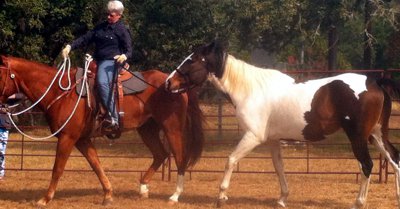11 Ways to Keep the Confined Horse Happy
Most horses are happiest living in a pasture, and if your horse gets injured, most minor injuries will heal just as well with the horse turned out. Occasionally, however, a serious injury requires stall confinement. Prolonged stall confinement can lead to stomach ulcers or vices, such as cribbing or weaving. Here are 11 ways you can keep your confined horse happy.
- If possible put your horse in a stall or small pen that is open where the horse can see out on all sides.
- Put another horse or companion animal in another stall close by.
- Keep hay in front of the horse at all times. If your horse gets too heavy, you can use a hay net with smaller-than-normal holes to slow down hay consumption.
- Cut the grain portion of the diet in half but do not decrease supplements.
- Add additional nutritional and digestive support so your horse will have the nutrients he needs to heal as quickly as possible. I like Bluegreen Algae for nutrition and digestive support, and Noni or Xango juice for extra antioxidants. KLPP, Fastrack or Probi digestive products are other options for digestive support.
- Put hanging balls or lick toys in the stall to give your horse something to play with. Some horses like cones or balls with handles to push around.
- The flower essence Rescue Remedy can be added to your horse’s water to help keep your horse calm. The homeopathic remedy chamomile is another option to calm some horses.
- If your horse starts to get irritable or goes off feed, he may be developing ulcers. Products such as Succeed, UF, green clay or aloe/slippery elm are all options for healing and preventing ulcers.
- Calming herbs such as Relax Blend can be useful for some high-energy horses who have to be confined.
- Hand walk your horse several times a day if possible. Taking the horse to the arena to watch other horses work, or out to graze can have a huge effect on his mental attitude. Some ground exercises can be done to keep your horse limber and focused.
- Get body work done to keep your horse comfortable and help prevent compensation muscle spasms that can cause further lameness.
Performance horses who have to be confined regularly can benefit from some of these same actions. Research shows that confinement is one of the most common reasons for ulcer development so it is worth going to the extra trouble to keep it as stress free as possible. Vices that develop during time kept in a stall may persist even after the horse is turned back out.
Last but not least, the time your horse must be kept up can be used for bonding. More attention to grooming and scratching those itchy spots can make your horse appreciate you, and this will serve you well when training resumes.
About the Author
Madalyn Ward, DVM, owns Bear Creek Veterinary Clinic in Austin, Texas. She is certified in Veterinary Homeopathy and Equine Osteopathy.
Memberships include American Veterinary Medical Association, American Association of Equine Practitioners, American Holistic Veterinary Medical Association, Texas Veterinary Medical Association and the Academy of Veterinary Homeopathy.
She has authored several books and publishes at her blog.
